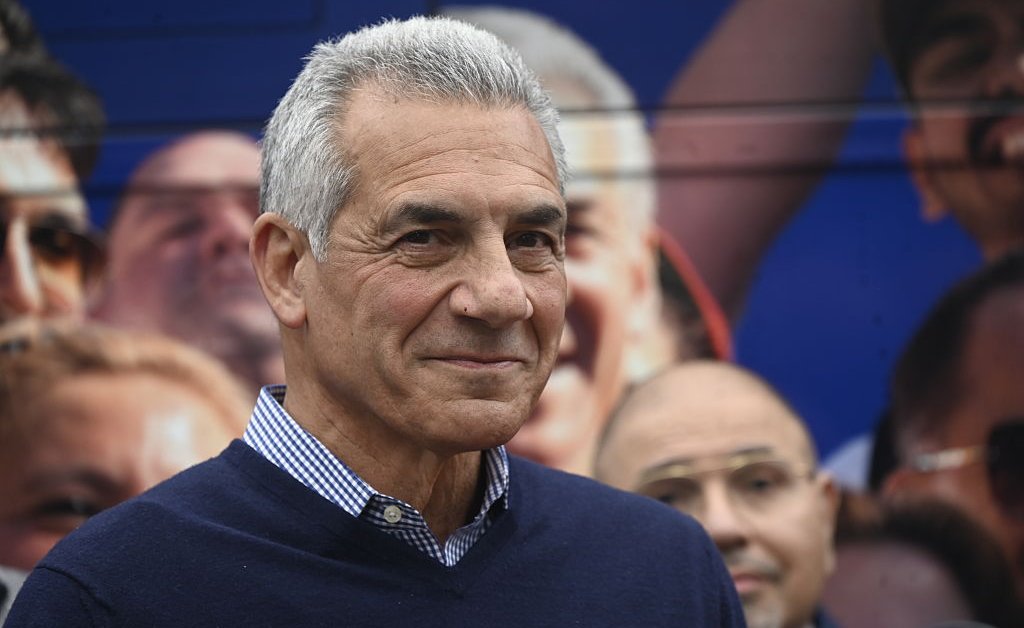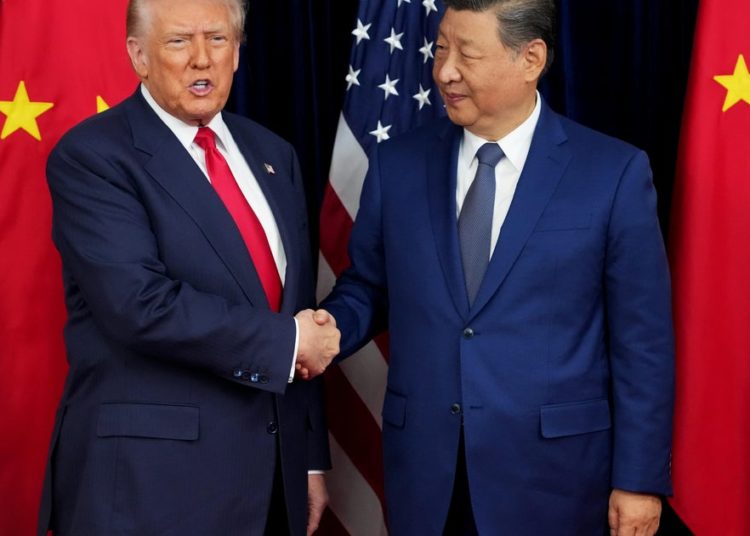On a bright Saturday morning, ten days before New Jersey voters choose their next governor, Jack Ciattarelli sinks into the leather booth of his brand-new campaign bus—glossy blue, oversized decals of supporters plastered to the windows—and lists the ways he believes the Garden State would fare better with a governor who can get along with the man in the Oval Office.
“It’s incumbent upon any governor in this country that once the election is over to work in partnership with your fellow elected officials,” the Republican nominee for governor tells me in a more than hour-long interview on Oct. 25, as we depart a rally in Paramus. “My opponent is constantly saying she’s going to be suing the President for this and suing the President for that… A relationship is important. That doesn’t mean we don’t disagree.”
That balancing act—a promise to be a Republican governor who can collaborate with the President without blindly following him—sits at the center of Ciattarelli’s case to a state that has voted against Trump every time he’s been on the ballot. It’s a pitch tailored for New Jersey, where registered Democratic voters substantially outnumber Republicans but saw a rightward shift in the last election. So far, the approach appears to be narrowing the gap: Multiple polls show he’s trailing his Democratic opponent Rep. Mikie Sherrill by single digits; others show the race virtually tied. Ciattarelli is touting Trump’s support when it helps, but also emphasizing points of daylight, particularly on immigration and green energy. He’s shared the stage with MAGA figures like Vivek Ramaswamy, Byron Donalds, and Jack Posobiec, while also locking up endorsements from some of Jersey’s Democratic mayors. The coalition he’s building is an improbable one, but Ciattarelli insists it’s his best path to victory. Simply put: he needs the Trump base to win; he also needs some of the Trump skeptics.
The President isn’t making that tightrope any steadier. The night before we spoke, Trump phoned into Ciattarelli’s tele-rally with a blunt reminder of where he expects loyalties to lie. “He’s got a friend in the White House,” Trump said on the call. “Whereas she certainly doesn’t,” he added in reference to Sherrill. The remarks were part of Trump’s broader pitch that a Republican governor in New Jersey would make the state more favorable to his Administration.
Ciattarelli stiffens slightly at Trump’s characterization. “You know, I don’t use the word ‘friend,’” he tells me of their relationship the following day. “We don’t get a chance to play golf together. We don’t get a chance to dine. But I do believe we have a solid relationship.” He adds that they talk every couple of weeks.
For Ciattarelli, that alliance captures the strange gravity of politics in 2025. With Trump back in the White House, his hold on the Republican Party remains total, yet his brand appears adaptive. In places like New Jersey, where a Republican presidential candidate hasn’t won since 1988, Trumpism has taken on a subtler, more local form: less about grievance, more about governance. Ciattarelli is its clearest test case.
The 63-year-old former assemblyman isn’t campaigning as a culture warrior or firebrand. He’s running as the kind of Republican who insists he can talk to Trump without becoming him—an image that may prove crucial in a state that has a history of electing moderate Republican governors. His challenge is persuading undecided voters that his alliance with Trump is a pragmatic partnership, not a political surrender.
If Ciattarelli can pull that off, it would mark not just an upset in New Jersey but a potential blueprint for the GOP’s path forward in swing and blue-leaning states—a test of whether Republicans can soften the edges of Trumpism without losing its energy. “The real majority party in New Jersey are the 2.5 million unaffiliated, independent voters—and they lean right,” he tells me, tapping the table in front of us for emphasis. “And they’re not real happy.”
Ciattarelli is in a decidedly good mood as the bus rolls between campaign stops in this politically mixed stretch of Bergen County in North Jersey. For months, New Jersey’s 2025 governor’s race was considered sleepy political theater—the kind expected to reaffirm the state’s blue credentials before national operatives move on. But suddenly party strategists are paying far more attention to him than they did during his last two runs for governor.
“This time feels very different,” he says confidently. Just an hour earlier, about 50 people gathered inside a Paramus golf club hall to hear him speak. Ciattarelli began with a familiar litany: rising taxes, surging utility bills, and a state government that had stopped working under the current Democratic leadership. The crowd nodded in rhythmic agreement. Property tax increases—among the highest in the nation—have pushed some longtime residents toward the exits. Electricity rates this summer climbed 22% from a year earlier, faster than all but one state. A once-unshakable blue electorate suddenly appears restless.
Ciattarelli has been here before. He came razor-close to winning his last gubernatorial race, losing by just three percentage points to incumbent Gov. Phil Murphy in 2021. “I really believe I would have won last time if it wasn’t for the pandemic,” Ciattarelli says. “I couldn’t shake hands with people.” Also a factor was Trump, who had just lost the state by 16 points. “Nobody thought I had a shot in hell,” he says. “So I got no national attention. Got no national help.”
Four years later, Murphy is term-limited and Ciattarelli’s campaign has gained traction by tying Sherrill to the outgoing governor, whose popularity has slumped, according to some polls. It also helps that no political party has held the New Jersey governorship for three straight terms since 1961. In every stop on Saturday, Ciattarelli makes a point of emphasizing how his Jersey roots go deeper than his opponent’s. “She wants you to think she’s a Jersey girl,” he says of Sherrill to the crowd in Paramus. “She’s not from New Jersey. So I got a really simple idea. How about we elect the Jersey guy?”
Ciattarelli can trace his New Jersey roots back a century to his grandparents, who immigrated from Valentano, Italy, to Raritan, a small Italian enclave in Somerset County, where they owned local businesses and raised three generations of Ciattarellis. Sherrill, a former Navy helicopter pilot and federal prosecutor, grew up in Northern Virginia before moving in 2010 to Montclair in Northern New Jersey, where she ran for Congress eight years later, flipping a seat long held by Republicans.
Ciattarelli is also leaning heavily on his business résumé, telling me he views the governor’s office as “being CEO of this $60 billion enterprise with 60,000 employees, 9 million citizen customers, and 1 million business customers.” After earning an MBA from Seton Hall University, he became a certified public accountant and founded Galen Publishing, a medical education company that produced journals and other literature for universities and clients. He sold the company in 2017, netting him millions. (Sherrill claims Ciattarelli’s business printed articles that downplayed opioid addiction and developed an app designed to help people find doctors who could prescribe opioids. Ciattarelli’s campaign has denied the allegations and said it planned to file a defamation lawsuit against Sherrill).
He says politics came calling in a more personal way: the mayor of his hometown, a longtime family friend, encouraged him to run for town council, recognizing both his family’s standing in the community and his professional credentials. So in 1990 he began a five-year stint as a member (and later president) of the Raritan Borough Council. After a long hiatus from politics, he got back into the arena in 2007 as a Somerset County Freeholder (now called commissioners).
That’s around the time he says he first recalls meeting Trump, at a local Republican Party dinner where the real estate mogul was courting GOP leaders in Somerset County to build his Bedminster golf club. In 2011, Ciattarelli was elected to the state Assembly, a six-year stint that overlapped with Trump’s political rise. At first, Ciattarelli wasn’t a fan. In 2015, while a state legislator, he called the then-first-time presidential candidate a “charlatan.” Later that year, he followed up in a statement: “Sitting silently and allowing him to embarrass our country is unacceptable. He is not fit to be president of the United States.”
He says his views on Trump evolved after his first term. When Ciattarelli ran for governor a second time, he moved closer to the MAGA wing of the party but remained critical of Trump’s role inciting the Jan. 6, 2021 riot at the Capitol—even as he spoke at a “Stop the Steal” rally in 2020 fueled by Trump’s false claims of widespread voter fraud in his loss to Joe Biden. (Ciattarelli later said he thought the event was meant to back Republican legislative candidates, and called Jan. 6 “a very, very sad day in our nation’s history.”) Now in his third bid for governor, Ciattarelli is embracing Trump more than ever, telling voters at a recent debate that he would “certainly give the president an A” grade for his second term so far.
“I think that he’s different in terms of his executorial skills,” Ciattarelli tells me of Trump. “Not that he was terrible before, but he’s even better now, and I think he’s made some fantastic choices in who surrounds him this time around. I see a lot more stability with his inner circle, where last time we didn’t have that.”
Trump rewarded him with a full-throated endorsement on Truth Social: “Jack, who after getting to know and understand MAGA, has gone ALL IN, and is now 100% (PLUS!).” The President added that Ciattarelli “will work closely with me and the Trump Administration to advance our America First Agenda.”
But their alignment hasn’t been without friction. Ciattarelli recently sought to distance himself after Trump promoted a conspiracy theory linking Tylenol to autism (“I wasn’t real happy,” he tells me. “I haven’t seen any literature that verifies that.”) Then, the President announced he had “terminated” the Gateway Project, which would connect New York City to New Jersey via two new tunnels under the Hudson River (“It’s critically important to Jersey,” he says).
For a candidate who relies on Trump’s support to energize the base but also needs to appeal to suburban moderates and independents, these moments test the tightrope he’s walking: close enough to win the MAGA vote, but not so close that it undermines his credibility with the rest of the state.
Dan Cassino, executive director of the New Jersey-based Fairleigh Dickinson University Poll, says Ciattarelli has found himself “in a difficult position” because he can’t distance himself too far from Trump without risking blowback. “If he says something anti-Trump, he runs the risk of Trump putting out a social media post before election day saying, ‘This guy’s betraying me,’” Cassino says. “He can’t distance himself from Trump, but he also wants to say, ‘I would speak out’ … It’s untenable in the long term.”
At the tele-rally on Friday night, Ciattarelli repeatedly thanked the President for his support and applauded his efforts “to secure the border and enhance national security” and “improve the economy.” Trump, who was calling in from the Oval Office before he departed for Asia, joked that Ciattarelli constantly calls him about energy prices. “He’s called my office five times talking about energy,” Trump said. “That’s all he wants to talk about—energy.” Ciattarelli chuckles when I ask if that’s true.
“We talk about a whole lot of things,” he says. “I call once every couple weeks.” Mostly, he wants Trump’s support for a key campaign pledge: lowering utility bills in part by pushing for a fourth nuclear power plant, installing solar panels on the rooftops of warehouses, and rolling back construction of offshore wind farms he says will never satisfy the state’s energy needs. “We talk a lot about energy because he’s not a green energy guy,” Ciattarelli says of Trump. “Those calls,” he adds, “they go an hour at a time.”
The White House, he says, is “happy to do whatever” the campaign believes will help. While he doesn’t rule out a visit from Trump in the final days before Election Day, Ciattarelli suggests it might be a distraction. “If the President were to come here 10 times between now and Election Day, and I’m out there not talking about the issues that matter to New Jerseyans—it’s not gonna matter,” Ciattarelli says. “The candidate has to win the election.”
Meanwhile, Sherrill has made her strategy clear: tie Ciattarelli to Trump at every turn. She has called Ciattarelli “100% MAGA” and accused him of failing to stand up for New Jersey, using the President’s suspension of $16 billion in funding for the Gateway Tunnel project as an example. Trump has said the project is permanently canceled amid the government shutdown, along with “tremendous numbers of Democrat projects.” If elected, Sherrill has vowed to sue Trump over his suspension of the funding for the Gateway Tunnel project. “He’s shown zero signs of standing up to this president,” Sherrill said of her opponent at an October debate.
Ciattarelli, who also supports the Gateway Tunnel, tells me he has not asked Trump to restore funding for the project, which he insists is not actually in danger. Trump, he says, is simply using the funding of a project critical to New Jersey and New York as a “chess piece in hardball negotiations” with Democrats in Congress to end the federal government shutdown. (Both the House and Senate Democratic leaders are from New York City).
“I haven’t gone there with him, because I believe that he’s involved in a very difficult negotiation,” Ciattarelli tells me. “Trump understands how important that project is to the region’s economy. He understands how important this region’s economy is to the country’s economy.”
To see how Ciattarelli is threading the needle on Trump, consider his approach on two of the biggest issues in the race: immigration and energy. In both cases, he is blending Trumpian, hardline rhetoric with solutions aimed at moderates and independents.
Ciattarelli says on Day One he will end sanctuary cities and prohibit New Jersey from being a sanctuary state, implying that New Jersey would work closely with the Trump Administration on immigration enforcement. “What I’ve told the President is he won’t have to worry about sending a national reserve here because we will be a law-and-order state,” Ciattarelli says.
Asked if any of the ICE raids in New Jersey this year give him any pause, Ciattarelli responds: “I have not seen ICE raids in New Jersey. I have seen ICE raids around the rest of the country.” There have, in fact, been multiple reported ICE raids in New Jersey since Trump’s term began, including in Edison and Newark. In August, 29 workers were arrested as part of a warehouse raid in Edison—one of the largest sweeps in the region this year. Days after the interview, another immigration raid took place at a warehouse in Woodbridge.
Despite his embrace of Trump on immigration enforcement, Ciattarelli also says he has concerns with the type of mass deportation that Trump officials are pursuing. He has instead called for a “pathway to recognition” for long-term undocumented residents with no criminal record, including offering them Social Security numbers and driver’s licenses. “Until I hear a viable plan to deport 14 million people—which I don’t think is in our best interest,” he says, “let’s give them a real social security number so they’re not working under a falsified one, which means they’re never going to get the benefits. And let’s give them something like a driver’s license, so we know who they are… We need to get these people out of the shadows.”
It’s a similar balancing act on energy, where Ciattarelli sounds like Trump when he promises to ban wind farms from being built off the Jersey coast, and then more like a liberal when he vows to expand solar installations on warehouse rooftops. The state’s soaring electric bills have become the marquee issue in the race. Ciattarelli’s plan to fix that begins with pulling New Jersey out of the Regional Greenhouse Gas Initiative, or RGGI, a cap-and-trade system that requires fossil fuel plants to purchase tradeable emission allowances for every ton of carbon they emit—a cost that is then added to the cost of producing electricity. The idea, when it began in 2005, was simple: make it more expensive to pollute, and power companies will pollute less. Supporters credit it with helping close coal plants and funding cleaner energy in member states. But Ciattarelli calls it a “carbon tax” that has failed to clean the air. “By pulling out,” he explains, “we can save anywhere from $300-500 million a year for homeowners, tenants, and businesses.”
When I ask Ciattarelli how soon New Jerseyans would see those savings, he doesn’t hesitate. “They can see it in their first couple months that I’m in office,” he says. “Look at any electricity bill today. There is a RGGI charge, there is a societal benefit charge, all those things immediately come off the bill.” Energy analysts aren’t so sure. There’s no separate line item labeled “RGGI charge” on most consumer electricity bills—the cost is embedded in generation prices. And because energy prices are set using a three-year average of auction results, any savings from leaving RGGI could take time to filter through.
Still, the politics are potent. Sherrill has made energy a part of her pitch as well, vowing to declare a state of emergency on utility costs and freeze rate hikes for a year to give families immediate relief—a plan that Gov. Murphy and others have questioned over legal concerns.
Other parts of Ciattarelli’s campaign hint at the breadth of his ambitions—from reshaping the state Supreme Court to rethinking how government operates. He tells supporters he would appoint two new justices to the state Supreme Court to help enact his agenda. “I’m not appointing anybody to the Supreme Court that doesn’t agree with us,” he said at one rally, before floating ultraconservative Assemblyman Jay Webber of Morris Plains as a possible nominee—a move he said would “drive them nuts.”
He’s also pitching a structural overhaul of Trenton itself, proposing a New Jersey equivalent of the Trump Administration’s Department of Government Efficiency, or DOGE. The agency, he tells me, would consolidate oversight and auditing functions to “reduce the size and cost of a state government that I believe is bloated and inefficient.”
But the loudest cheers often come when the talk turns to Jersey’s divisive plastic bag ban. “Here’s the best part of my energy plan for you,” he says in Bloomfield. “At the supermarket, you get back your plastic bags.” The crowd roars. “Brings down the house every single time,” Ciattarelli jokes.
Off-year gubernatorial races rarely attract much national attention. This year, all eyes are on just three contests nationwide—and most of the chatter has centered on Zohran Mamdani’s meteoric mayoral run across the Hudson as a democratic socialist. In North Jersey, part of the New York City media market, Mamdani’s name recognition might actually eclipse all of the gubernatorial candidates, Cassino says. But a Ciattarelli victory would suddenly redirect some of that attention to him as the creator of a potential GOP blueprint for 2026 and beyond, one that blends Trump’s populism with a local, pragmatic sheen in places long thought out of reach.
Back on the campaign bus, as we head to a Hebrew school in Tenafly, an aide plays a video clip of Sherrill implying that she would endorse Mamdani. “If he’s the Democratic candidate, which it sounds like he is, I assume I will (support him),” she says in the clip from July. Ciattarelli tells me he plans to mention that to the Jewish audience he’s about to meet. “Not that they need reminding,” he says. Sherrill has since walked back those comments and said she would not weigh in on the New York City race, though Mamdani has openly endorsed her.
I hear Ciattarelli bring up Mamdani at every campaign stop that day. I ask him why he keeps bringing up a candidate for New York City mayor. “In the Jewish community, he’s playing a huge role,” he says. “I think it’s critically important—we want people to know things about Mikie Sherrill that she doesn’t want people to know,” adding that many New Jersey residents work in New York. “This guy [Mamdani] called the NYPD a racist, anti-queer threat to the community. Are these 400,000 New Jerseyans going to be safe?” he asks. “They don’t stop being my responsibility the moment they leave the state.” (Mamdani has since apologized for those comments he made in 2020).
For Ciattarelli to pull off an upset, he needs a very specific set of circumstances. One is if the Democratic turnout collapse that defined 2024 repeats itself—particularly in Passaic County, where anger over the Biden Administration’s handling of Gaza kept many Muslim voters home. The other requires expanding the GOP map: peeling off enough working-class Black and Latino voters in places like Elizabeth, Newark, and Camden to blunt the Democrats’ urban advantage. “The way a Republican wins is by convincing Democrats that the Democratic nominee is just so bad you can’t possibly vote for them, so you should probably just stay at home, or maybe even go for a moderate Republican,” Cassino says. “That’s what Chris Christie did.”
Ciattarelli is acutely aware that the nation is watching New Jersey. If a Republican can win here while Trump’s second term is constantly hijacking voters’ attention, it could signal a seismic shift in strategy around the mid-terms. But he insists he’s not merely a barometer.
“Might people mimic the themes?” Ciattarelli asks. “Yeah. But one thing you can’t easily mimic is positive energy.”
The post Jack Ciattarelli Walks the Trump Tightrope appeared first on TIME.




